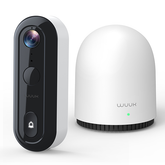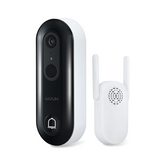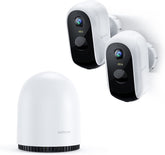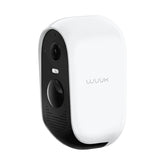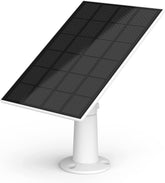IP Cameras vs. CCTV Everything You Need to Know
As we advance in an increasingly digital era, security has become paramount for both individuals and businesses worldwide. Security cameras are a crucial tool in this endeavor, serving as our eyes and ears when we can't be on the spot. They enable us to record, monitor, and review events remotely, adding a layer of protection and peace of mind. Among the array of surveillance solutions, IP (Internet Protocol) cameras and CCTV (Closed Circuit Television) cameras have risen as the principal contenders, each bringing a distinct set of capabilities to the table.
Navigating surveillance systems can be daunting, whether you're a homeowner aiming to enhance your residential security or a business owner striving to safeguard your valuable assets. The decision isn't about opting for the 'better' solution, but rather discerning the unique characteristics of each system and aligning them with your specific needs.
In this in-depth guide, we shed light on everything you need t know about IP cameras and CCTV cameras-from understanding their basic functions and distinct features to exploring their operation, assessing their safety levels, and deciphering their differences. Beyond this, we aim to assist you in making an informed choice about the camera system that best suits your circumstances.

What are IP cameras?
IP cameras, or Internet Protocol cameras, are advanced digital video cameras designed to transmit data over a network or the internet. Unlike traditional webcams, which necessitate a direct connection to a personal computer, IP cameras can independently send and receive data from anywhere globally, provided an internet connection is available.
A defining feature of IP cameras is their capacity to compress video data for broadcast. This involves codec technology (Coder-Decoder) that compresses video data to facilitate efficient transmission over the network before decompressing it for viewing or storing.
Two types of IP cameras exist: Centralized IP cameras, which rely on a central Network Video Recorder (NVR) for recording, video, and alarm management, and Decentralized IP cameras, which come equipped with built-in recording functions, thus obviating the need for a central NVR.
A typical IP camera incorporates a lens, image sensor, processors, and memory. The lens channels light onto the image sensor, which then transforms it into electrical signals. These signals undergo processing to create a video image that is subsequently compressed, stored, or transmitted over the network.
IP cameras are known for their high resolution, remote administration capabilities, advanced video analytics, scalability, and flexibility. Moreover, they support wireless connectivity and can integrate seamlessly with other security technologies, making them a comprehensive solution for sophisticated security requirements.
What does an IP camera do?
In essence, an IP camera operates like a digital camera, capturing video footage. However, its standout attribute lies in its capability to compress these files and transmit them over a network. Consequently, IP cameras enable real-time surveillance and recording of events within their field of view, accessible from any location worldwide, given an internet connection.
IP cameras find application in diverse scenarios, including home security, retail surveillance, crowd control, and traffic management. Thanks to sophisticated analytics, they can detect movement, recognize faces, count individuals, track objects, and trigger alarms, delivering valuable insights and alerts for security operations.
IP cameras also play an instrumental role in remote management, allowing property owners to keep an eye on their premises from afar. Furthermore, IP cameras equipped with two-way audio capabilities facilitate communication between the monitoring station and the site under surveillance, thereby elevating security to another level.
Are IP cameras safe?
In general, IP cameras are indeed safe. However, as with all devices connected to the internet, they are not entirely immune to cyberattacks. Cybercriminals could potentially gain access to the video feed, manipulate the footage, or disable the camera altogether.
Hence, securing your IP camera is of utmost importance. This includes implementing strong, unique passwords, maintaining up-to-date camera firmware, utilizing encrypted connections, disabling remote online viewing when not required, and integrating network security measures such as firewalls and VPNs.
While no system is entirely invincible, implementing these security measures significantly enhances your IP camera's safety, making it considerably more challenging for potential intruders to breach.

What is CCTV?
CCTV, an acronym for Closed-Circuit Television, is a surveillance system that operates on a closed loop. Unlike IP cameras that transmit data over networks, CCTV cameras are directly connected to a recording device-usually a Digital Video Recorder (DVR) or a monitor-using coaxial cable or wireless communication channels.
A traditional CCTV system consists of cameras, a DVR, cables, and a monitor. The cameras capture images, convert them into electronic signals, and transmit them to the DVR or monitor. The DVR then records, processes, and stores the data for later retrieval.
CCTV cameras are renowned for their simplicity and reliability. They come with various features like night vision, infrared detection, and motion detection. CCTV cameras are available in different forms, such as bullet cameras (ideal for outdoor use), dome cameras (often used indoors), and PTZ cameras (pan-tilt-zoom cameras that offer rotational and zooming capabilities), offering flexibility for different surveillance needs.
What is CCTV used for?
CCTV is widely used in various environments for surveillance purposes. Its primary function is to deter, observe, and document activities within its field of view, whether it's inside a retail store, on a city street, or in a school.
In the retail industry, for instance, CCTV cameras are used to prevent theft, monitor customer behavior, and oversee cash registers. In residential settings, they help deter crime and monitor visitors or trespassers. For cities and municipalities, CCTV aids in monitoring traffic, deterring crime, and aiding in law enforcement.
Apart from surveillance, CCTV cameras are also increasingly used in business settings to increase productivity. Employers use these cameras to monitor employee activities and behaviors, thereby ensuring operational efficiency.
Can CCTV run without the internet?
Yes, CCTV systems can operate without an internet connection because the cameras and recording device form a closed circuit for capturing and storing video. The cameras connect via coaxial or Ethernet cables to a DVR or NVR device, which has hard drives to store footage locally. This allows continuous recording even without connectivity to the outside internet. The DVR or NVR will also have ports to connect a monitor directly for live viewing of cameras. So, the core functionality of cameras recording footage and live viewing works off the closed internal wired connections between the CCTV components without needing any external internet connectivity. The limitations without the internet would be features like remote access from smartphones, sending footage to cloud storage, or AI-based analytics. But the CCTV system can still perform its primary job of recording footage for evidence and monitoring areas live through the closed circuit between cameras and the recorder.

IP cameras vs. CCTV: what's the difference?
IP cameras and CCTV cameras are both integral components of video surveillance systems, contributing significantly to security measures in various settings. At first glance, they might seem interchangeable; however, a closer inspection reveals key differences in their operation, performance, and applications.
The term "CCTV," often used as a catch-all phrase for video surveillance systems, can create some confusion. Technically, IP cameras can be integrated into a CCTV setup, transmitting footage to a specific location with a finite set of monitors. However, "CCTV" traditionally refers to analog video surveillance systems directly connected to a recording device or monitor.
Let's delve into the significant differences between IP and CCTV cameras:
Data Transmission
CCTV cameras transmit analog video signals via coaxial cables to a Digital Video Recorder (DVR), where it's converted into digital format for storage or viewing. Conversely, IP cameras convert video signals into digital format within the camera itself and transmit the data over a network or internet connection.
Resolution
IP cameras generally boast superior image resolution compared to CCTV cameras. The high-resolution feature of IP cameras ensures greater image detail, allowing for enhanced identification of subjects within the video footage.
Installation & Wiring
CCTV systems typically necessitate more extensive wiring than IP systems, with each camera requiring a direct connection to the DVR. On the other hand, IP cameras can easily integrate into any existing network infrastructure, thereby reducing wiring complexity.
Cost
CCTV cameras are often less expensive than IP cameras, making them a favored choice for budget-conscious consumers. However, the superior functionality, versatility, and future-proof nature of IP cameras may yield a better return on investment over time.
Access and Control
IP cameras provide remote access and control through any internet-enabled device, a feature typically lacking in traditional CCTV cameras.
Analytics and Advanced Features
IP cameras frequently come equipped with sophisticated video analytics features, such as motion detection, line crossing detection, and facial recognition, features typically unavailable with traditional CCTV cameras.

Making a Choice: IP vs. CCTV Cameras
Choosing between IP and CCTV cameras is largely contingent on your specific security needs, budget constraints, and infrastructure. Here are some crucial factors to bear in mind when choosing between the two:
- Budget: If budget is a significant constraint, CCTV cameras could be a more affordable choice. However, consider the potential additional expenses for cabling and reduced flexibility that might offset the lower upfront costs.
- Image Quality: If high-quality imagery is a top priority for your surveillance needs, IP cameras are undoubtedly the superior option. They deliver higher-resolution images and superior video quality compared to traditional CCTV cameras.
- Scalability: If you envision expanding your surveillance system in the future, IP cameras might be a better fit. They are easier to scale, as adding cameras to the network does not necessitate running additional cables back to a DVR.
- Integration: If you aim to integrate your surveillance system with existing network infrastructure or other security technologies, IP cameras are likely the better choice.
- Remote Access: If remote monitoring of your camera feeds is required, IP cameras are your "Mr. Right". You can access camera feeds from anywhere via an internet connection, a capability not typically possible with traditional CCTV cameras.
Conclusion
In today's world, the security of our homes, businesses, and public spaces has become a top priority. Whether you opt for IP or CCTV cameras, understanding their features, functions, and differences can help you make an informed decision that best meets your surveillance needs.
Remember, the best security system is the one that fits your specific requirements and provides peace of mind. So, assess your needs, do your research, and choose wisely. Your safety, after all, is paramount.


